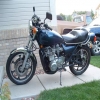Compression Ratio verses Compression test results
- tellietubbie
-
Topic Author
- User
-

Public
- Thanks: 0
Compression Ratio verses Compression test results
05 May 2006 15:27
Could someone, anyone, please, explain to me the connection between compression ratio and compression test results using a compression gauge? I would be so grateful for a straight answer! I understand gas laws but can't make the connection. p.s. guess what? I'm a newbie at this game!
Please Log in or Create an account to join the conversation.
- Duck
-

- Offline
- User
-

Registered
- e vica na i sau na ga
- Posts: 1267
- Thanks: 35
Re: Compression Ratio verses Compression test results
05 May 2006 15:57
You mean how do we get 160psig with 9:1 and 14.7psi ambient?
We do work in compressing the gas and add energy to the system! Ideal gas law and kinetic theory of gasses
edited to fix link
Post edited by: Duck, at: 2006/05/05 19:01
We do work in compressing the gas and add energy to the system! Ideal gas law and kinetic theory of gasses
edited to fix link
Post edited by: Duck, at: 2006/05/05 19:01
Please Log in or Create an account to join the conversation.
- tellietubbie
-
Topic Author
- User
-

Public
- Thanks: 0
Re: Compression Ratio verses Compression test results
05 May 2006 16:07
Thanx for the input Duck, but I don't get it.To stupid I guess.
Post edited by: tellietubbie, at: 2006/05/05 19:09
Post edited by: tellietubbie, at: 2006/05/05 19:15:blink:
Post edited by: tellietubbie, at: 2006/05/05 19:27
Post edited by: tellietubbie, at: 2006/05/05 19:09
Post edited by: tellietubbie, at: 2006/05/05 19:15:blink:
Post edited by: tellietubbie, at: 2006/05/05 19:27
Please Log in or Create an account to join the conversation.
- Willo46
-

- Offline
- User
-

Registered
- Posts: 79
- Thanks: 0
Re: Compression Ratio verses Compression test results
05 May 2006 17:50
I picked up some info trying to figure out my rebuilt engine measuring 100-120 psi cylinder pressures.
1: The compression ratio is the ratio between the volume of the cylinder at BDC and the volume at TDC. This is fixed when the engine is built. Not too much rocket science there.
2: When measuring cylinder pressure with a gauge, as the piston comes up compressing the gas in the cylinder, the temperature of the gas increases and is trying to expand, increasing the measured pressure over and above what would be theoretically calculated based on the compression ratio and atmospheric pressure. This temperature effect supposedly increases the gas pressure to about twice the theoretical amount.
3: However, the intake valve typically closes after BDC. At cranking speed (low engine RPM), some amount of gas is allowed to be pushed back out of the cylinder before the valve closes so this reduces the actual amount of gas being compressed. Obviously the valve timing will affect this to some degree.
Normal engines will have a measured cylinder pressure of roughly 17 - 20 times the compression ratio at cranking speed.
Hope this helps.
1: The compression ratio is the ratio between the volume of the cylinder at BDC and the volume at TDC. This is fixed when the engine is built. Not too much rocket science there.
2: When measuring cylinder pressure with a gauge, as the piston comes up compressing the gas in the cylinder, the temperature of the gas increases and is trying to expand, increasing the measured pressure over and above what would be theoretically calculated based on the compression ratio and atmospheric pressure. This temperature effect supposedly increases the gas pressure to about twice the theoretical amount.
3: However, the intake valve typically closes after BDC. At cranking speed (low engine RPM), some amount of gas is allowed to be pushed back out of the cylinder before the valve closes so this reduces the actual amount of gas being compressed. Obviously the valve timing will affect this to some degree.
Normal engines will have a measured cylinder pressure of roughly 17 - 20 times the compression ratio at cranking speed.
Hope this helps.
Please Log in or Create an account to join the conversation.
- 77KZ650
-

- Offline
- User
-

Registered
- Posts: 1397
- Thanks: 7
Re: Compression Ratio verses Compression test results
05 May 2006 18:45
check out the
comp ratios
thread I started awhile back, it really cleared up the issue for me:) , lots of good info posted by other guys
Scott
Scott
07 MDP Rookie of the Year
01 ZX-12R street/drag bike. 8.97 @155.7 pump gas, dot tires, no bars, no power adders. top speed in the 1/4: 161MPH
01 ZX-12R street/drag bike. 8.97 @155.7 pump gas, dot tires, no bars, no power adders. top speed in the 1/4: 161MPH
Please Log in or Create an account to join the conversation.
- Duck
-

- Offline
- User
-

Registered
- e vica na i sau na ga
- Posts: 1267
- Thanks: 35
Re: Compression Ratio verses Compression test results
05 May 2006 20:36
PV=nRT
or P=nRT/V
The volume goes down so the pressure goes up.
But, you also heat the mix when it acquires the energy used to compress it. This makes 'T' bigger so the quotient is more than
you would see with a constant 'T'.
for example
if 'T' were constant: 10:1 compression and 14.7PSI ambient gives 147PSI.
If the work of compressing the gas doubles 'T' you will see 294PSI.
Physics is fun because it provides a framework for how everything works.
Post edited by: Duck, at: 2006/05/05 23:41
or P=nRT/V
The volume goes down so the pressure goes up.
But, you also heat the mix when it acquires the energy used to compress it. This makes 'T' bigger so the quotient is more than
you would see with a constant 'T'.
for example
if 'T' were constant: 10:1 compression and 14.7PSI ambient gives 147PSI.
If the work of compressing the gas doubles 'T' you will see 294PSI.
Physics is fun because it provides a framework for how everything works.
Post edited by: Duck, at: 2006/05/05 23:41
Please Log in or Create an account to join the conversation.
- tellietubbie
-
Topic Author
- User
-

Public
- Thanks: 0
Re: Compression Ratio verses Compression test results
06 May 2006 05:18
Usually I'd say "Thank God". On this occasion, thankyou to the guys on KZRider.This was confusing the hell out of me and I couldn't decide whether to buy new pistons/rings or not 'cos I didn't understand the implications of the crazy readings the compression tests gave. e.g cylinder 1 dry =155 but wet was 287 !!
Now I understand, thanks a lot guys! .
.
While I'm here, when [when, when???] I finish this 500 can I have a category in the piccy section of my own 'cos I havn't seen any other members with a 500 and so no piccys? Just a thought.
Just a thought.
Now I understand, thanks a lot guys!
While I'm here, when [when, when???] I finish this 500 can I have a category in the piccy section of my own 'cos I havn't seen any other members with a 500 and so no piccys?
Please Log in or Create an account to join the conversation.
- kawtoy
-

- Offline
- User
-

Registered
- Posts: 806
- Thanks: 6
Re: Compression Ratio verses Compression test results
06 May 2006 08:31
PV=nRT.. Oh God, I am back in Thermodynamics class. NOOOOOOOOOOOOOOOOOOOOOOOOOOOOOOOOOOOOOOOOOOOOOOOO
Harley Davidson- Turning gas into noise without the harmful affects of horsepower for over 100 years.
Please Log in or Create an account to join the conversation.
- RetroRiceRocketRider
-

- Offline
- User
-

Registered
- ...bring in the machine that goes PING!
- Posts: 1641
- Thanks: 29
Re: Compression Ratio verses Compression test results
06 May 2006 10:37
tellietubbie,
I'm guessing that you have a Kawi Z/KZ500-4 cylinder?
That's a pretty rare model, and one that never made it's way over here to the US market. I'd imagine it's because we already had the KZ550 model.
If it is indeed the Z/KZ500-4 you own, there was a member of the now archived KZr site, SkynyrdMan (John), who also owned one.
He did quite a bit of work on that bike, and a great portion of the parts he had to manufacture himself since he was unable to find even a parts listing for his bike. If you do a search under his name in the archives, it will pull up a lot of great info pertaining to it.
Check out THIS THREAD in the archives, it shows some really nice pics of his bike.
I know that a few members here have/had contacts with him.
ibsen22000 (Ivar) is one that I know of that even had an opportunity to meet up with John some time back.
If you were wanting some specs and/or info on what John did on his Z/KZ500-4, I imagine if you asked nicely enough that one of the other members here could either relay a message for you, or possible even put you in contact with John directly.
I'm guessing that you have a Kawi Z/KZ500-4 cylinder?
That's a pretty rare model, and one that never made it's way over here to the US market. I'd imagine it's because we already had the KZ550 model.
If it is indeed the Z/KZ500-4 you own, there was a member of the now archived KZr site, SkynyrdMan (John), who also owned one.
He did quite a bit of work on that bike, and a great portion of the parts he had to manufacture himself since he was unable to find even a parts listing for his bike. If you do a search under his name in the archives, it will pull up a lot of great info pertaining to it.
Check out THIS THREAD in the archives, it shows some really nice pics of his bike.
I know that a few members here have/had contacts with him.
ibsen22000 (Ivar) is one that I know of that even had an opportunity to meet up with John some time back.
If you were wanting some specs and/or info on what John did on his Z/KZ500-4, I imagine if you asked nicely enough that one of the other members here could either relay a message for you, or possible even put you in contact with John directly.
Covina, So Calif!
78 KZ650-B2 = SOLD
84 ZN700 LTD = SOLD
84 ZX750 GPz = SOLD
89 GSX1100F Katana = SLEEPING
20 VN1700 Vulcan Vaquero (the Blue Cowboy)
Looking for my next project KZ
78 KZ650-B2 = SOLD
84 ZN700 LTD = SOLD
84 ZX750 GPz = SOLD
89 GSX1100F Katana = SLEEPING

20 VN1700 Vulcan Vaquero (the Blue Cowboy)
Looking for my next project KZ
Please Log in or Create an account to join the conversation.
- hwms
-
- Offline
- User
-

Registered
- Posts: 263
- Thanks: 1
Re: Compression Ratio verses Compression test results
06 May 2006 12:17
I didn't understand the implications of the crazy readings the compression tests gave. e.g cylinder 1 dry =155 but wet was 287 !!
Are you saying that when you put some oil in the cylinder and retest that you get a reading some 85% higher, IE: 287/155 ?. I would wonder about this large increase.
Are you saying that when you put some oil in the cylinder and retest that you get a reading some 85% higher, IE: 287/155 ?. I would wonder about this large increase.
Please Log in or Create an account to join the conversation.
- Duck
-

- Offline
- User
-

Registered
- e vica na i sau na ga
- Posts: 1267
- Thanks: 35
Re: Compression Ratio verses Compression test results
06 May 2006 13:57
kawtoy wrote:
It's all TT's fault ; His initial question contained the statement,
His initial question contained the statement,
PV=nRT.. Oh God, I am back in Thermodynamics class. NOOOOOOOOOOOOOOOOOOOOOOOOOOOOOOOOOOOOOOOOOOOOOOOO
It's all TT's fault ;
 His initial question contained the statement,
His initial question contained the statement, I understand gas laws but can't make the connection.
Please Log in or Create an account to join the conversation.
- tellietubbie
-
Topic Author
- User
-

Public
- Thanks: 0
Re: Compression Ratio verses Compression test results
06 May 2006 16:42
hwms,the compression tester came off ebay is about 20 years old.........first time Ive done one..ho hum,the whole reason was to get an indication of the integrity of the 26 year old piston rings. I accept the differences between cylinders as the most important aspect, the actual observed readings simply confirmed my suspicions that they'd need replacement.So far the best I've found cost £252 for four new second oversize pistons and ringsets so bugger the bills, I'm having them.Regards.
Please Log in or Create an account to join the conversation.
Moderators: Street Fighter LTD


